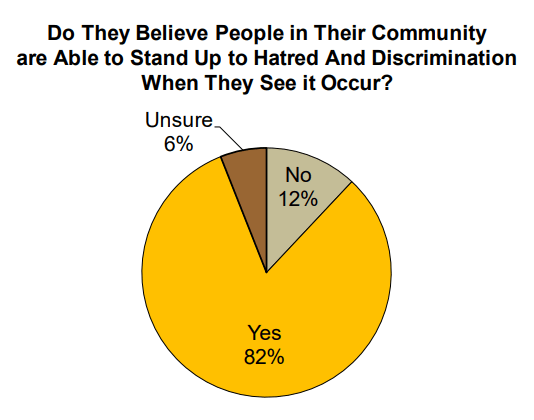 Image: Blog hero Plant Plate 09 boys dig in
Image: Blog hero Plant Plate 09 boys dig in
Rural Minnesotans confident they can stand up to hate, says Rural Pulse survey

by Alie McInerney Posted in Tools You Can Use
Mild-mannered, courteous and reserved. Minnesotans are famously known for their “Minnesota nice,” passive aggressive personalities. But restraint only goes so far, according to data from the Rural Pulse that found a whopping 82 percent of rural Minnesotans say people in their community are able to stand up to hatred and discrimination when they see it occur. Men (86%) and younger rural residents (90%) were the most confident that local people can stand up to hate.

Rural Minnesota communities are facing changes and pressures today that challenge us to forge new relationships. Hatred and discrimination happen in our communities and it must be met with hope, leadership and the firm belief that communities are stronger when they work for all residents – a belief reflected in Rural Pulse findings.
Hatred and discrimination come in many forms, though. It can be active or passive; target age, gender, race, sex, disability, etc.; and can happen at home or work, among friends or strangers. It takes skill and practice to be able to identify hate and defuse a situation in a way that causes the least harm to yourself and the person being discriminated against.
As rural communities become more diverse, and situations arise where people are called on to stand up to hate and promote civility, we have pulled together resources, tips and practices that you can carry with you in community.
Hatred and Discrimination in Public Places
Hollaback! is a people-powered movement to end harassment. They offer resources to help people stand up to hate, including a guide for bystander intervention. They offer a guide built around the Five D’s, different methods you can use to support someone who’s being harassed, emphasize that harassment is not okay, and demonstrate to people in your life that they too have the power to make the community safer. They include:
- Direct: overtly name what is happening or confront the harasser.
- Distract: derail the incident by interrupting it. Ignore the harasser and engage directly with the person who is being targeted.
- Delegate: ask for assistance, for a resource or for help from a third party.
- Delay: if you can’t intervene in the moment, check in with the person who was targeted after it occurs.
- Document: record the incident on video, audio or paper, depending on the situation.
View the full guide at Hollaback!
Hatred and Discrimination in Private Places
Research shows that when engaged in intimate conversation with someone (close or new relation), avoiding blame and encouraging empathy is most effective. Here are strategies you can lean on when you find yourself in these conversations.
- Use “I” statements: rather than blame the other person, talk about how their comment impacted you and how you feel about it.
- Clarify their stance: test out the phrase, I heard you say [comment]. Is that what you meant?
- Talk to them in private: don’t call them out. You have a better chance of a successful conversation if you minimize outside influence.
- Let them walk in others’ shoes: Try building empathy by asking them questions that makes them walk in another’s shoes.
- Check your aggression: your power to persuade diminishes if you use an aggressive tone. Try to approach the situation with curiosity.
- Listen to their perspective: help the person feel heard, and they might be more welcoming to your point of view.
Hatred and Discrimination in the Workplace
Standing up to hate in the workplace comes with unique challenges. Your actions will vary depending on the situation. Practice spotting discrimination and get familiar with your internal reporting policies.
Spot it
Workplace discrimination falls into two buckets:
- Disparate Treatment is when an employer intentionally singles out an individual or a group of people for unequal treatment for an illegal reason. Examples include someone who is denied a promotion because of race or threatened because of sexual orientation.
- Disparate Impact is when an employer has a policy or practice that has the effect of discriminating and which is not related to an actual requirement of the job. Examples include forbidding employees from speaking languages other than English or imposing lifting requirements for a job that doesn’t require lifting.
Report it
Internal policies will guide how to report workplace discrimination. Make sure you have easy access to organizational policies and if they need updating, start the movement to propose the necessary changes.
Stopping Hate Before it Happens
Leaders across rural Minnesota are creating spaces to foster relationships and build bridges to strengthen their communities. Efforts like It’s Time to Talk: Forums on Race, Welcoming Communities program, and Project FINE’s Welcoming Table are effectively helping community members see each other and have honest conversations in a safe and inviting way.
Minnesotans are confident that hated and discrimination can be met with hope and leadership. Rural Pulse shows this. It’s up to us to be prepared, to stand up, and use our skills to build healthy communities that work for all.
Sign Up for E-News
Subscribe to our periodic newsletter for updates and opportunities about vibrant rural Minnesota.